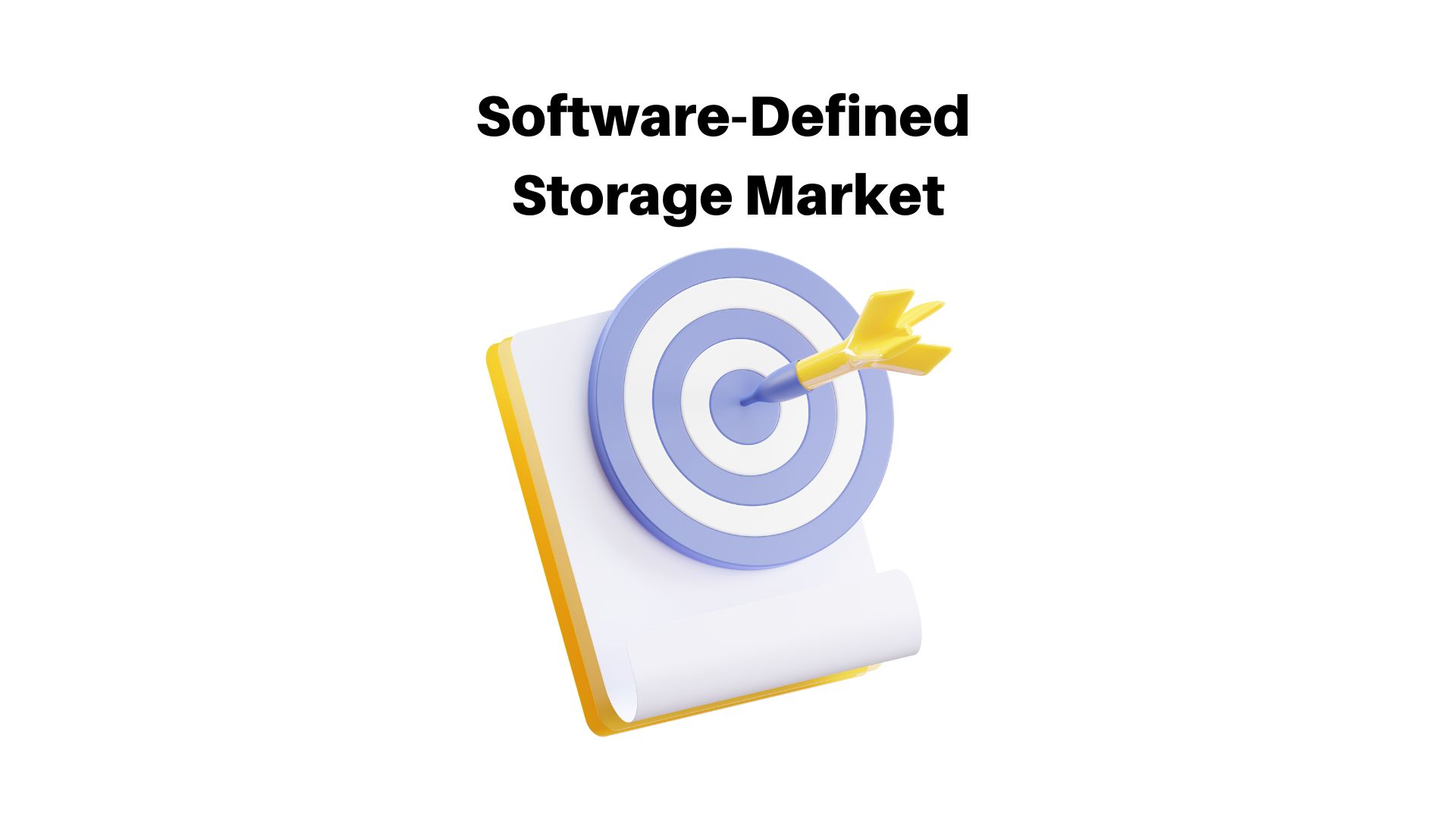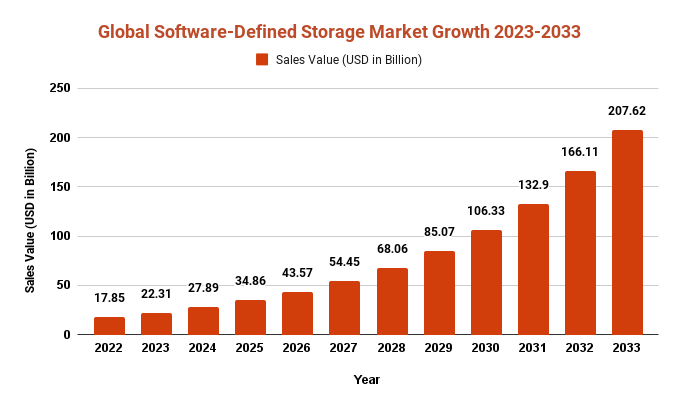Software-Defined Storage Market Will Hit USD 207.62 Bn By 2033

Page Contents
Market Overview
Published Via 11Press: Software-defined storage (SDS) is a storage architecture that completely separates the hardware of a device from its software manager. Software-defined storage Market simplifies storage management by abstracting it away from the physical infrastructure and implementing it in software, offering greater versatility, scalability, and cost-efficiency compared to traditional storage solutions. SDS (Solid State Disk System) can be implemented through various methods, such as virtualization, software-based storage controllers and distributed architectures. It enables organizations to manage their storage resources from a centralized interface regardless of where the devices are physically located. This approach helps organizations optimize their resources, maximize utilization rates and simplify storage management.
The Global Software-Defined Storage market represented USD 17.85 Bn in 2022 and will anticipate around USD 207.62 Bn by 2033 projected around CAGR of 24.99% amid forecast frame of 2023 to 2033.
One of the primary advantages of SDS is its support for multiple storage types, such as block, file and object-based storage, through a unified management interface. SDS solutions can also be integrated with cloud storage services to give businesses seamless access to both on-premises and cloud resources. SDS can be deployed on commodity hardware which enables organizations to take advantage of economies of scale associated with off-the-shelf components – drastically cutting down on overall cost of storage for small and medium sized enterprises (SMEs).
Key Takeaways
- SDS decouples storage hardware from software management, offering greater flexibility, scalability, and cost efficiency compared to traditional storage solutions.
- SDS can be implemented in various ways, such as virtualization, software-based storage controllers and distributed storage architectures.
- SDS allows centralized storage management, regardless of the physical location of devices. This provides optimized resources, increased utilization rates and simplified management processes.
- SDS allows for the seamless integration of multiple storage types, such as block, file and object-based, within a single management interface. Furthermore, SDS can work seamlessly with cloud storage services.
- SDS can be deployed on commodity hardware, allowing organizations to take advantage of the economies of scale associated with off-the-shelf hardware and drastically reduce storage costs.
- SDS offers a scalable cost-effective storage solution that can be tailored to suit the requirements of organizations of all sizes.
Get Software-Defined Storage Market Sample Report: https://marketresearch.biz/report/software-defined-storage-market/request-sample/

Regional Snapshot
- North America is the leading market for software-defined storage, driven by an increasing adoption of cloud computing, big data analytics and virtualization technologies.
- Europe is an increasingly significant market for software-defined storage, driven by the growing need for solutions across various industries.
- Due to the rising adoption of cloud based technology and rising demand for storage solutions in emerging economies such as India and China, the Asia Pacific market for software-defined storage is expected to expand rapidly.
- Latin America is witnessing a boom in software defined storage. Brazil and Mexico are leading the charge with advanced storage solution adoption.
- Due to an increasing adoption of cloud technology and an ever-increasing need for storage solutions across various industries, Middle East and Africa have become major market for software defined storage.
Drivers
- Data volumes continue to explode, necessitating storage solutions that can scale quickly and cost-effectively. Software-defined storage offers this flexibility; you can scale resources up or down as needed without needing to invest in extra hardware.
- Traditional storage solutions can be costly due to the need to purchase and maintain expensive hardware. Software-defined storage, however, runs on commodity hardware, drastically cutting down on storage costs.
- Software-defined storage offers organizations the agility and pliability they need to adapt quickly to changing business demands. Resources can be provisioned and managed from a unified management interface, making it simpler to allocate them as needed.
- The growth of virtualization technologies has driven up demand for software-defined storage solutions. These can be seamlessly integrated with virtualization platforms, providing flexibility and scalability to support virtualized environments.
- Software-defined storage has become an increasingly popular solution with the rise of cloud computing. These solutions can easily integrate with cloud platforms, giving organizations the capacity to store, manage and access their data in the cloud.
- Advanced storage solutions are essential for managing massive amounts of data generated through big data analytics. Software-defined storage provides the scalability and flexibility necessary for these applications to run efficiently.
Inquire with our industry specialist: https://marketresearch.biz/report/software-defined-storage-market/#inquiry
Restraints
- Integration Challenges: One of the primary difficulties with software-defined storage is its incompatibility with existing storage infrastructure. Migrating data from traditional solutions to software-defined storage can be a time-consuming and intricate process.
- Security Concerns: As data becomes more critical to organizations, security threats become even more urgent. Software-defined storage solutions may introduce potential hazards like unauthorized access to data or vulnerabilities within the software itself.
- Lack of Standardization: The absence of standards in software-defined storage solutions makes it difficult for organizations to evaluate and compare different options. This could also cause compatibility problems with other hardware and software systems.
- Performance: Software-defined storage may not always offer the same level of performance as traditional solutions, particularly when latency-sensitive applications require faster response times.
- Complexity: Software-defined storage solutions can be difficult to deploy, configure and administer. Organizations may need specialized expertise in order to effectively manage and sustain the solution.
- Limited Awareness: Software-defined storage is a relatively recent technology, and many organizations may not be aware of its potential advantages or how to implement it within their environment.
Opportunities
The rise of cloud computing offers software-defined storage vendors a significant window of opportunity. Organizations moving their applications and data to the cloud will need storage solutions that are compatible with cloud platforms, offering seamless access to both on-premises and cloud-based storage resources. Virtualization technologies present a major opportunity for software-defined storage vendors. Their solutions can be integrated with virtualization platforms, providing the flexibility and scalability necessary to support virtualized environments. Big data analytics presents a major opportunity for software-defined storage vendors. As organizations generate and analyze larger amounts of information, they will need storage solutions that can efficiently store and manage this data at low costs.
Hybrid cloud solutions present a unique opportunity for software-defined storage vendors. As organizations look to take advantage of both public and private clouds, they need storage solutions that can be seamlessly integrated with both environments. Converged infrastructure solutions present an opportunity for software-defined storage vendors. Converged infrastructure systems integrate compute, storage and networking into one integrated system, offering a highly efficient and scalable platform to run applications. Edge computing presents a great opportunity for software-defined storage vendors. Edge computing involves processing data closer to its source, necessitating storage solutions that can be deployed remotely and provide low latency access to files.
Challenges
Software-defined storage solutions can be difficult to deploy, configure and manage. Organizations may require specialized expertise for management and upkeep of the solution. One major drawback with software-defined storage is its integration into existing infrastructure; migrating data from traditional solutions to software-defined storage can take time and be laborious. Furthermore, software-defined storage may not always offer the same performance as traditional solutions in latency-sensitive applications.
As data becomes more and more critical to organizations, security concerns become even more urgent. Software-defined storage solutions may introduce security risks such as unauthorized access to data or vulnerabilities in the software. Furthermore, due to lack of standardization among these solutions, organizations find it difficult to evaluate and compare different options or develop compatibility issues with other hardware and software systems. While software-defined storage may provide cost savings in the long run, setting up such a system requires an initial investment – especially for smaller organizations.
Market Segmentation
Usage:
- Data Backup & Disaster Recovery
- Surveillance
- Storage Provisioning
- and Others
Software:
- SDS Server
- SDS Controller Software
- Data Security
- Data Management
- and Others
Industry:
- BFSI
- Telecom
- Manufacturing
- Education
- Media & Entertainment
- Healthcare
- Information Technology
- and Others [Logistics and Warehouse]
Key Players
- Huawei Technologies Co.ltd.
- Cisco Systems, Inc.
- Fujitsu Limited
- Commvault Systems Limited
- SCALITY INC.
- Infinidat Limited
- Nutanix, Inc.
- IBM Corporation
- VMWare, Inc.
- Dell EMC (Dell Technologies Inc.)
- Oracle Corporation
- NetApp, Inc.
- Hitachi Vantara Corporation
- Inspur Systems Inc.
- Hewlett-Packard Enterprise.
Report Scope
| Report Attribute | Details |
| Market size value in 2022 | USD 17.85 Bn |
| Revenue forecast by 2033 | USD 207.62 Bn |
| Growth Rate | CAGR Of 24.99% |
| Regions Covered | North America, Europe, Asia Pacific, Latin America, and Middle East & Africa, and Rest of the World |
| Historical Years | 2017-2022 |
| Base Year | 2022 |
| Estimated Year | 2023 |
| Short-Term Projection Year | 2028 |
| Long-Term Projected Year | 2033 |
Growing Demand => Request for Customization
Recent Developments
- Object Storage: This software-defined storage solution has seen a meteoric rise in popularity due to its flexibility and scalability. Object storage systems enable data to be organized into objects with metadata describing what the object is and how it can be utilized.
- Multi-Cloud Support: Software-defined storage solutions now support multiple cloud environments, enabling organizations to utilize various cloud providers and move data easily between them.
- AI and Machine Learning Integration: Software-defined storage solutions now incorporate artificial intelligence (AI), machine learning (ML) and other technologies to simplify data management, automate tasks and enhance storage performance.
- Kubernetes Integration: Kubernetes has become the de facto standard for container orchestration. Many software-defined storage systems now integrate with Kubernetes to provide a flexible and scalable platform for containerized apps.
- Edge Computing: Software-defined storage solutions have been specifically tailored for edge computing environments. In these settings, data processing and storage takes place closer to its origins. Even in remote locations, edge storage can provide low latency access with easy retrieval of stored information.
- Hyperconverged Infrastructure (HCI): Hyperconverged infrastructure unifies compute storage, networking and computing into one system that offers a platform for running applications. HCI environments offer many software-defined storage options.
Key Questions
1. What is software-defined storage?
Software-defined storage provides data storage that is independent of the hardware it runs on giving you greater versatility and scalability when data management and storage are necessary.
2. What are the advantages of software-defined storage?
Software-defined storage offers greater adaptability and scalability than traditional storage solutions, enabling organizations to better manage data storage environments. It also integrates seamlessly with cloud computing platforms, virtualization technologies as well as other emerging technologies.
3. What are the major driving forces behind software-defined storage adoption?
Cloud computing, virtualization and big data analytics are the driving forces behind software-defined storage adoption.
4. What are the primary challenges associated with software-defined storage?
This technology may present a number of issues, such as complexity, integration problems and performance problems; security threats, cost overruns, lack of standardization and expense.
5. What are the latest advancements in software-defined storage technology?
Recent advances in software-defined storage include increased adoption of object storage, support for multiple cloud environments, integration with AI and machine learning technologies, support for Kubernetes and edge computing environments as well as hyperconverged infrastructure-specific software-defined storage solutions.
Contact us
Contact Person: Mr. Lawrence John
Marketresearch.Biz (Powered By Prudour Pvt. Ltd.)
Tel: +1 (347) 796-4335
Send Email: [email protected]
The team behind market.us, marketresearch.biz, market.biz and more. Our purpose is to keep our customers ahead of the game with regard to the markets. They may fluctuate up or down, but we will help you to stay ahead of the curve in these market fluctuations. Our consistent growth and ability to deliver in-depth analyses and market insight has engaged genuine market players. They have faith in us to offer the data and information they require to make balanced and decisive marketing decisions.